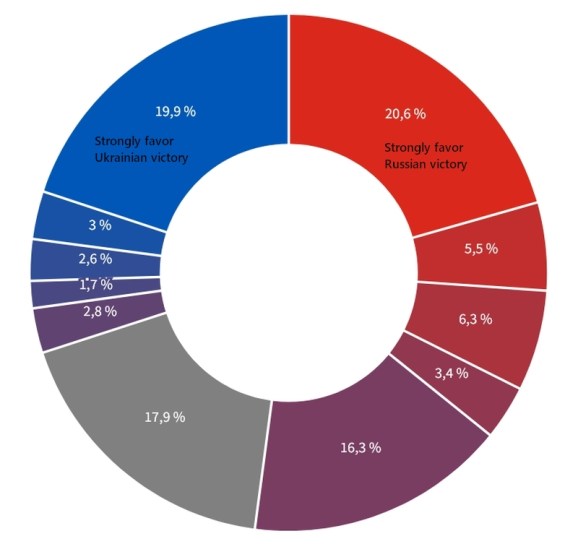Plurality of Slovaks Back Russia’s War Aims: Poll – Transitions Online
Followers of populist and far-right parties most strongly hope for a Russian victory over Ukraine. From Dennik N.
A majority of Slovaks would want Russia to win its war in Ukraine, according to data from a survey carried out in July by the pollster MNFORCE, the PR agency Seesame, and the Slovak Academy of Sciences. Participants responded to the question of how they would want the war in Ukraine to end. They graded their answers on a 10-point scale, with 1 being a clear Russian victory and 10 a clear Ukrainian victory.
One-fifth of respondents wanted a clear Russian victory. Overall, more than half of respondents leaned towards Russia [shown in shades of red; blue indicates Ukrainian supporters]. Some 18 percent said they didn’t know.
Around a third of respondents wanted Ukraine to win, with a fifth hoping for a clear-cut Ukrainian victory.

Smer Voters Trending Far-Right
It should be noted that some 16 percent of respondents selected “5,” which on the 1-10 scale is defined as leaning somewhat towards Russia, but some of this could just be people who chose what felt like a middle-of-the-road answer to them. Even if we factor in this effect, however, more people still want the aggressor to win.
Dennik N has analyzed the poll data using a number of demographic features and attitudes, such as party preference, region of residence, age, education, and COVID vaccination status.
Apart from showing the share of the individual responses on the scale, we also visualized the average point score given by a particular group. We also tested whether the differences are statistically significant. The average value of the given group is represented in the charts by a black dot.
When it comes to party preference, a Ukrainian victory is the outcome most preferred by the voters of the [ruling party] OLaNO, Progresivne Slovensko, and SaS. Those who vote for [junior coalition partner] Sme Rodina and Hlas-Social Democracy are somewhere in the middle, with voters of [former ruling party] Smer and the far-right L’SNS and Republika parties occupying the other end of the scale.
Putting aside any political motivations for Smer, communication-wise the party has entered a vicious circle. With its statements and attitudes, the party is turning its voters into supporters of the aggressor. At the same time voter opinion, combined with the overall polarization of society, are forcing the party to dig in even deeper. The statements and actions of the party, as well as the attitudes of its supporters, are now placing Smer alongside the far right.
Looking at the data by region, we can see that people from the Bratislava region [the wealthiest in the country by some distance – Transitions] are most supportive of a Ukrainian victory. On the other end of the spectrum we can find the Nitra and Presov regions [in southern and eastern Slovakia, respectively], which lean somewhat towards a Russian victory.
Education-wise, the trend is clear. The lower a respondent’s educational achievement, the more they wish for a Russian victory – and vice versa. This, however, is not necessarily just a reflection of education as such. Amid the energy crisis and inflation, less educated people could be feeling the socio-economic pressures more. Thus, they could be cheering for Russia not necessarily out of a geopolitical conviction but rather in the hope of a quick end to the war, as well as to the related energy crisis.
The Unvaccinated Support Russia
When it comes to age groups, there are no major differences in attitudes. One surprise are perhaps those aged 30 to 39, who are the most pro-Russian of all age groups. An intuitive explanation could be that this is the first generation that does not have real-life experience of the Soviet occupation of Czechoslovakia. The last Soviet soldier left Czechoslovakia in 1991.
One interesting piece of data is attitude correlated to COVID vaccination status. Those who have received the booster are the most pro-Ukrainian group. Those with vaccination but no booster are somewhere in between. The unvaccinated tend to want the aggressor to win the war.
It is precisely attitudes to the question of who should win a war – with one party clearly the aggressor and the other clearly defending itself – that show the extent to which the antivax movement is intertwined with pro-Russian propaganda.
It should also be noted that the poll data was collected in mid-summer. The attitudes of some respondents could have changed in the meantime, especially in relation to recent territorial gains by the Ukrainian army.
…
Daniel Kerekes is an analyst and data journalist at the Slovak news site Dennik N, where this article originally appeared. Republished with permission.
Translated by Matus Nemeth.
This article has been archived for your research. Find the original article here.


